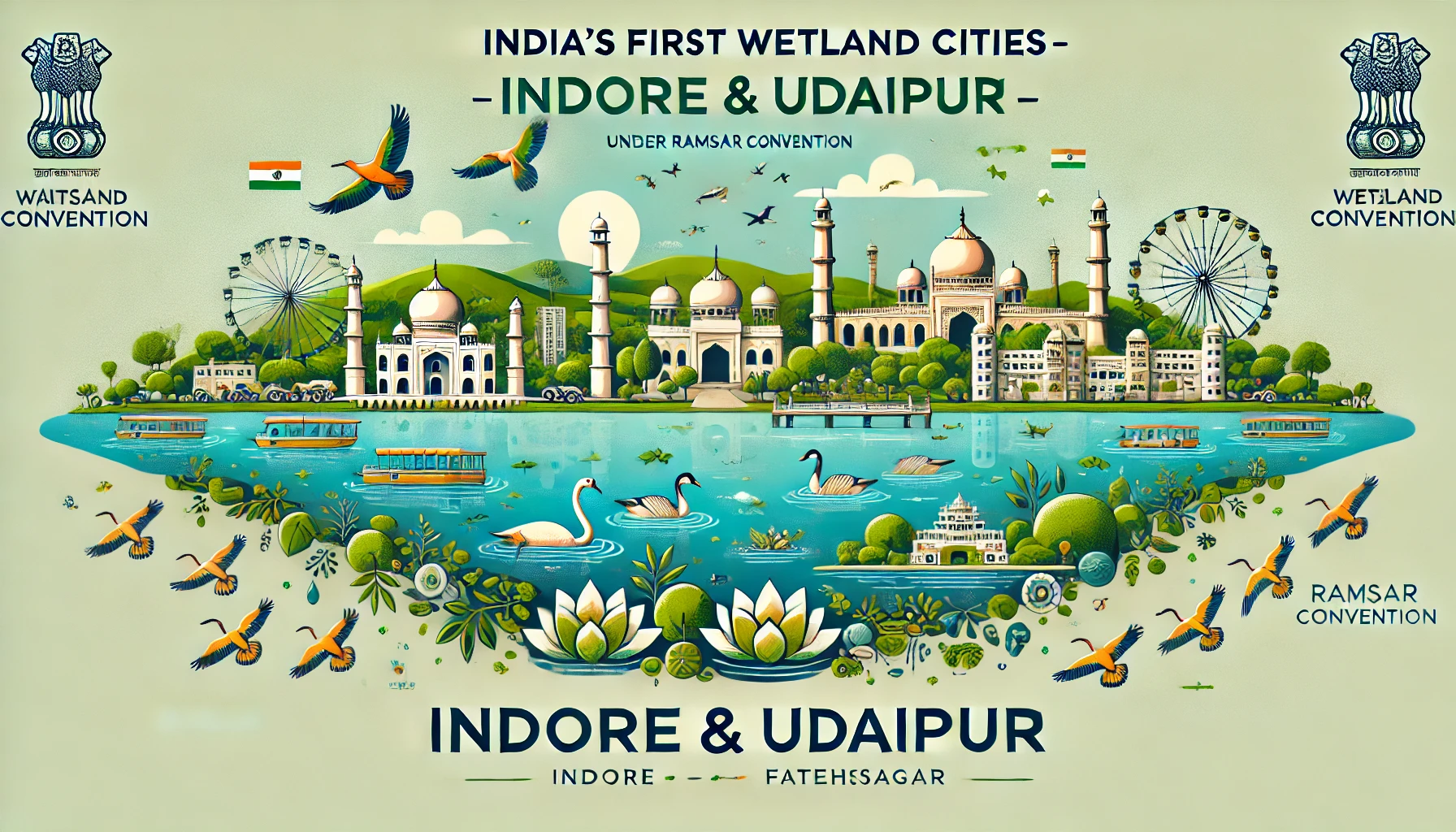India has achieved a significant milestone in environmental conservation as Indore and Udaipur have been awarded the prestigious Wetland City Recognition under the Ramsar Convention. This marks a historic achievement, making them the first cities in India to receive this international honor. This recognition highlights their commitment to wetland conservation, biodiversity, and sustainable urban development.
What is Wetland City Recognition?
The Wetland City Recognition is an international honor awarded under the Ramsar Convention on Wetlands. This recognition is given to cities that demonstrate exceptional commitment to protecting, restoring, and managing wetlands within urban landscapes. The primary goal is to balance urban expansion with ecological sustainability, ensuring that wetlands continue to provide vital ecosystem services such as water purification, flood control, biodiversity conservation, and climate regulation.
Why is Wetland Conservation Important?
Wetlands are often referred to as the “kidneys of the Earth” because they play a crucial role in:
- Water purification by filtering pollutants
- Flood control by absorbing excess rainwater
- Supporting biodiversity by serving as a habitat for various species
- Climate regulation by sequestering carbon
- Enhancing livelihoods through fisheries, tourism, and agriculture
With rapid urbanization and environmental degradation, wetland conservation is essential for sustainable development and climate resilience.
Indore and Udaipur: India’s First Wetland Cities
1. Indore – The Cleanest City & A Wetland Conservation Leader
Indore, known for its top rankings in cleanliness, has taken significant steps in environmental conservation. Sirpur Lake, a designated Ramsar site, is one of its key wetlands. It serves as a critical habitat for migratory birds and is being developed as a biodiversity hotspot. The city’s commitment to wetland preservation has earned it global recognition.
2. Udaipur – The City of Lakes & Ecological Harmony
Udaipur, often called the “Venice of the East”, is renowned for its pristine lakes, including:
- Pichola Lake
- Fatehsagar Lake
- Rangsagar Lake
- Swarup Sagar Lake
- Milk Talai Lake
These lakes not only enhance the city’s beauty but also play a crucial role in maintaining local climate balance, supporting aquatic life, and serving as water reservoirs. The city’s efforts in safeguarding its water bodies have positioned it as a leader in sustainable urban planning.

Key Benefits of Wetland City Recognition
- 🌿 Global Acknowledgment: Strengthens India’s standing in environmental sustainability.
- 🌍 Tourism & Economy Boost: Encourages eco-tourism and local business growth.
- 🏙️ Urban Resilience: Helps cities adapt to climate change through natural water management.
- 🦜 Biodiversity Conservation: Protects habitats for migratory birds and aquatic species.
- 💧 Water Security: Ensures clean and sustainable water sources for urban populations.
Quiz on Wetland City Recognition
Multiple Choice Questions (MCQs)
1. Which cities in India have received Wetland City Recognition under the Ramsar Convention?
a) Jaipur & Bhopal
b) Indore & Udaipur ✅
c) Delhi & Mumbai
d) Chennai & Hyderabad
2. What is the primary aim of Wetland City Recognition?
a) To promote tourism in cities
b) To encourage urbanization
c) To ensure conservation and sustainable management of wetlands ✅
d) To construct artificial lakes
3. Which famous lake in Indore is a Ramsar site and a bird sanctuary?
a) Bhojtal
b) Sirpur Lake ✅
c) Dal Lake
d) Hussain Sagar
4. Udaipur is known as the ‘City of Lakes.’ Which of the following lakes is NOT in Udaipur?
a) Fatehsagar
b) Pichola
c) Chilika ✅
d) Swarup Sagar
5. Which international agreement governs the recognition of Wetland Cities?
a) Kyoto Protocol
b) Ramsar Convention ✅
c) Paris Agreement
d) UN Water Treaty
True or False
6. Indore is the first Indian city to receive Wetland City Recognition.
- ❌ False (Both Indore & Udaipur are the first)
7. The Ramsar Convention primarily focuses on wetland conservation.
- ✅ True
8. Wetlands do not contribute to climate balance.
- ❌ False (Wetlands help in carbon sequestration and climate regulation)
9. Udaipur’s lakes have no ecological significance apart from tourism.
- ❌ False (They play a crucial role in climate balance and biodiversity)
10. Sirpur Lake in Indore is a man-made wetland.
- ✅ True
Conclusion: A Step Towards Sustainable Development
The recognition of Indore and Udaipur as Wetland Cities under the Ramsar Convention is a historic moment for India. It emphasizes the importance of wetland conservation in urban landscapes and sets an example for other cities to follow. As climate change and environmental concerns grow, sustainable management of wetlands will be key to securing water resources, preserving biodiversity, and fostering eco-friendly urbanization.
India’s leadership in wetland conservation is now recognized on the global stage, reinforcing its commitment to sustainable development and ecological balance.
🌍💧 What do you think about India’s first Wetland Cities? Should more cities focus on wetland conservation? Share your views in the comments! 🌱👇
SR Study | Chandra Classes
For more educational content, follow SR Study for updates on competitive exams, law, and environmental studies.



